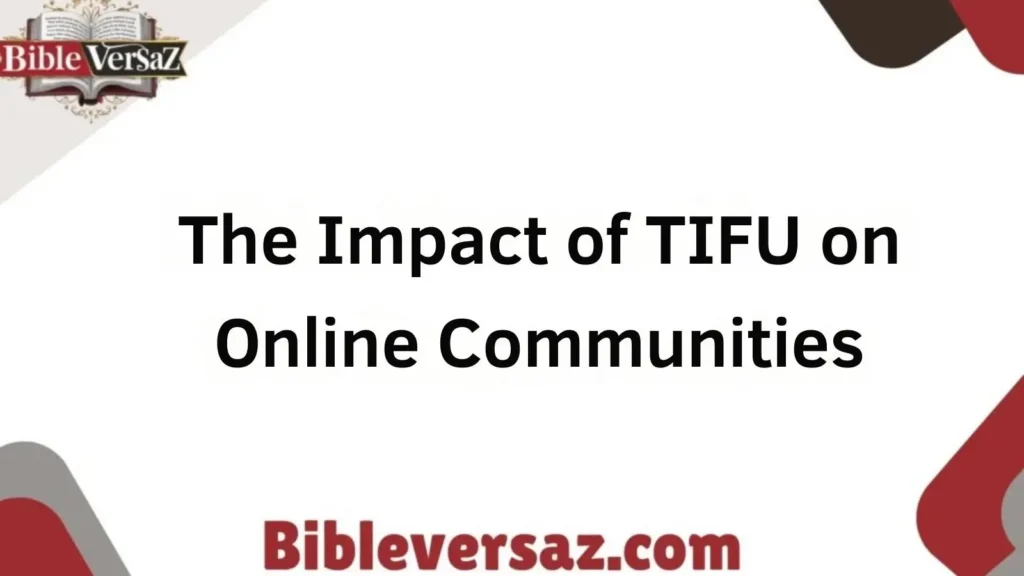Have you come across the acronym TIFU while scrolling through social media or browsing online? If you’re wondering what it stands for, you’re not alone!
TIFU has taken the internet by storm and has become a go-to phrase used in memes, stories, and daily conversations. But what does it truly mean, and why is it so popular in 2025?
In this article, we’ll break down the meaning of TIFU, its origins, and how it’s used across various online platforms.
Whether you’re looking to understand this internet slang for the first time or just curious about its growing relevance, this guide is for you. Keep reading to get the full scoop on TIFU and how it’s shaping online communication today!
The Origins of TIFU
Where Did TIFU Come From?
TIFU stands for Today I F**ed Up*. The term has roots in online communities, where users share their most embarrassing, unfortunate, or humorous mistakes with the world.
While it’s commonly used on social media, it specifically became well-known through Reddit, where people would post their “TIFU” stories to entertain others and sometimes seek advice or sympathy.
The term itself reflects the humorous side of human failure, making it relatable to a wide audience.
It’s all about turning embarrassing situations into moments of connection and even humor. This vulnerability resonates with people who might have made similar mistakes but weren’t brave enough to share them.
The Role of Reddit in Popularizing TIFU
Reddit plays a central role in the rise of TIFU. The r/TIFU subreddit, which was created in 2008, became the place for users to share their blunders, missteps, and mistakes.
The format was simple: write a short story about something embarrassing that happened, start the post with TIFU, and let the community react.
As Reddit grew, so did the subreddit’s popularity. The TIFU subreddit now has millions of subscribers, all eager to share their most cringe-worthy, funny, or downright bizarre personal stories.
The support and humor found in the comments section help users feel less alone, turning a potentially humiliating experience into a source of entertainment for all.
How TIFU Became a Cultural Phenomenon
TIFU didn’t stay confined to Reddit. As the term spread to other platforms like Twitter, Facebook, and TikTok, it quickly became a cultural phenomenon.
In fact, viral stories often use the hashtag #TIFU, amplifying the term’s reach even further.
Social media influencers and even celebrities have adopted the term, making it part of everyday online communication.
The idea of admitting to a mistake and laughing about it has caught on, allowing people from all walks of life to engage with the term.
How TIFU is Used
Understanding the Context
TIFU is often used humorously, but it can also carry a more serious tone.
Typically, it’s employed when someone shares an embarrassing or regretful situation they caused themselves, such as accidentally sending a text to the wrong person or messing up a job interview. It’s a great way to laugh at oneself, and that’s part of what makes it so relatable.
Here are some of the most common contexts where TIFU is used:
- Funny mishaps: When you do something silly, like eating a whole pizza by yourself and then realizing you have a food baby.
- Unfortunate mistakes: For example, sending a work email to the wrong person and making a fool of yourself.
- Emotional or social missteps: Such as misinterpreting a message and causing unnecessary drama.
- Job or school blunders: When you make a mistake at work or school, like messing up a presentation in front of colleagues or classmates.
Common Examples of TIFU
- “TIFU by accidentally telling my crush I liked them… in front of their boyfriend.”
A lighthearted, awkward moment where the user misreads the situation but laughs about it in the end. - “TIFU by eating an entire cake and realizing I was supposed to save it for my friend’s birthday.”
A funny, relatable situation where overeating leads to an awkward scenario. - “TIFU by showing up to a job interview in the wrong outfit.”
A more serious mistake, but one that the person can laugh about later after the shock wears off.
TIFU in Memes and Online Culture
With the rise of meme culture, TIFU has been turned into countless memes, turning personal failures into jokes that are shared and reshared by thousands.
These memes often take the form of images or short videos that exaggerate the embarrassment of the original incident, making them even more entertaining for those who enjoy dark humor or feel comforted by shared failure.
The Psychology Behind TIFU

Why People Share Their Mistakes Publicly
One key reason TIFU has become so popular is that people enjoy seeing others in a vulnerable state.
When someone admits to a mistake, it humanizes them and makes them more relatable. Publicly sharing mistakes, particularly in a funny or lighthearted way, can create a sense of connection with others who might have experienced similar blunders.
Social media has amplified this desire for vulnerability. Platforms like Twitter and Instagram reward authenticity, and TIFU fits perfectly into this culture.
By sharing stories of mishaps, people not only entertain others but also show their human side. This openness has contributed to the growing success of the term.
The Role of Catharsis in TIFU Stories
Catharsis refers to the emotional release that occurs when someone vents their feelings. TIFU stories often provide this release for the person telling them.
Writing down their experiences allows them to reflect on their mistakes and laugh about them, which can help reduce the negative emotions associated with those experiences.
Moreover, many users find comfort in the supportive comments that follow their TIFU posts.
Instead of facing ridicule, most TIFU storytellers are met with sympathy and encouragement, turning what could be an embarrassing moment into a shared experience.
TIFU’s Influence on Language and Communication
The Rise of Internet Slang and Acronyms
Acronyms like TIFU are part of the larger trend of internet slang, where abbreviations and shorthand are used to communicate quickly and efficiently.
In the fast-paced world of social media, people prefer using acronyms to save time and energy.
But beyond convenience, acronyms often carry their own cultural meaning, which deepens the connection between those who use them.
In addition to TIFU, there are many other popular acronyms and slang terms that have emerged over time, such as:
- SMH (Shaking My Head)
- LOL (Laugh Out Loud)
- FOMO (Fear of Missing Out)
- ICYMI (In Case You Missed It)
These terms represent different aspects of human emotion and experiences, and using them helps communicate complex feelings in a concise manner.
TIFU in Other Platforms
Although TIFU began on Reddit, it quickly spread to other platforms like Twitter, TikTok, and YouTube.
On Twitter, TIFU tweets often go viral, with users sharing short anecdotes of their embarrassing moments. TikTok has embraced TIFU by turning it into short-form videos, where creators can act out their blunders for comedic effect.
On YouTube, videos titled “TIFU Stories” or “TIFU Compilation” attract large audiences who love watching others make mistakes.
This cross-platform use highlights the flexibility of the TIFU acronym and its ability to adapt to different forms of online communication.
Misinterpretations of TIFU
Common Mistakes People Make About TIFU
Not everyone understands the humor or the intent behind TIFU. Some people assume that TIFU is simply about making light of serious mistakes, when in reality, it’s often more about laughing at minor failures or awkward situations.
While TIFU stories can be entertaining, they are not meant to diminish the significance of serious failures or tragedies.
Is TIFU Always Lighthearted?
While many TIFU stories are humorous, some can have a more serious tone. For example, someone might post a story about failing a major exam or making a big mistake at work, but still manage to laugh at the situation.
These posts highlight how TIFU is versatile – it can carry humor, but it can also be an honest reflection on failure.
TIFU does not always translate well into every context. Some stories can come across as insensitive or tone-deaf if the mistake is too serious or the person seems to be making light of real pain. It’s important to strike a balance between humor and respect for others.
The Impact of TIFU on Online Communities

How TIFU Contributes to Building Community
Sharing TIFU stories creates a sense of unity within online communities. People connect through their shared experiences of failure, which can foster camaraderie.
Reddit’s r/TIFU subreddit, for example, allows users to comment on each other’s posts, offering support, advice, or simply a friendly laugh.
This back-and-forth interaction strengthens the community by turning individual mistakes into shared moments of joy.
The Dark Side of TIFU
Despite its positive aspects, TIFU can sometimes have a negative impact. Oversharing or making public blunders can lead to shaming or mockery, especially if the mistake is particularly embarrassing.
In some cases, the user might receive negative attention that they didn’t expect or want.
It’s essential for online communities to be mindful of respecting privacy and creating a safe space for people to share their TIFU stories without fear of judgment.
TIFU Beyond the Internet
TIFU in Real Life: Relating Online Experiences to Everyday Life
While TIFU may have originated in online communities, it has increasingly influenced real-life conversations.
People now refer to their own mistakes as “TIFU moments” when speaking to friends or family.
The term has become shorthand for acknowledging a mistake and laughing at it, even in face-to-face interactions.
From Meme to Movement: TIFU in Popular Media
TIFU has even made its way into mainstream media. TV shows, movies, and news outlets have referenced the term, further cementing its place in pop culture.
It’s not just an online trend; it’s part of the broader conversation about failure, vulnerability, and human connection.
Conclusion
TIFU is more than just an acronym. It’s a reflection of how we view mistakes and failures in the digital age.
It allows people to embrace their human flaws and laugh at themselves, fostering a sense of connection with others who can relate.
Whether lighthearted or serious, TIFU stories have become a significant part of internet culture.

Emily Johnson’s approach to Bible study is both heartfelt and scholarly. At BibleVersaz.com, she draws on her extensive knowledge to explore the deeper meanings of biblical passages, helping readers discover new layers of understanding and spiritual growth.


